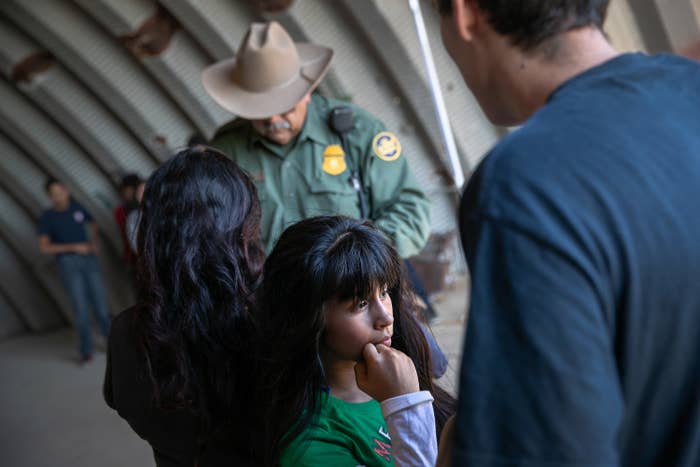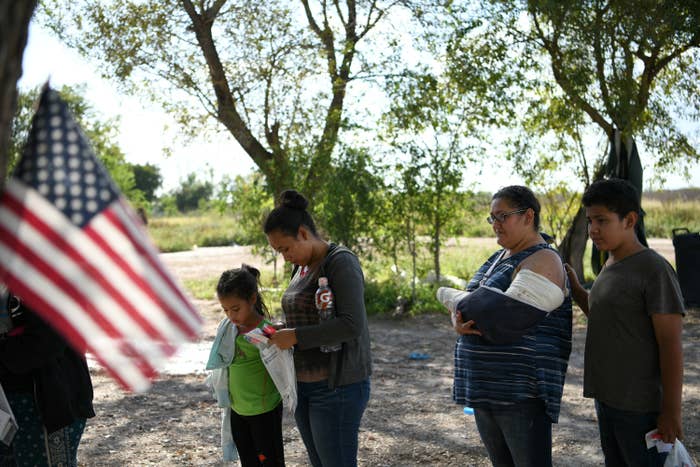
Since Border Patrol agents started conducting initial asylum screenings in June, they have approved fewer than half of the nearly 2,000 screenings they have completed, marking a steep drop from the usual rate of approvals done by asylum officers, according to government data obtained by BuzzFeed News.
The data confirms fears that immigrant advocates have had about the controversial pilot project launched by the Trump administration in June to have Border Patrol agents conduct the interviews, in addition to US Citizenship and Immigration Services asylum officers who have exclusively done so in the past. The 47% passage rate by border agents appears to be lower than the publicly available data, which shows USCIS officers typically have a more than 80% passage rate in initial credible fear screenings.
Immigration advocates fear that Border Patrol agents are using an “enforcement mindset” in what is essentially a humanitarian screening to determine whether a person has a fear of persecution in their home country.
Administration officials have long been critical of the first asylum interview, known as a credible fear screening, as being too lenient. They have pushed asylum officers to be stricter in such interviews. Advocates and experts believe the pilot project is part of an overall focus to dismantle the asylum process, along with rules to bar asylum for those who cross through Mexico to get to the southern border.
“It signifies a different perspective. Border Patrol is a law enforcement agency. They are not adjudicators. Border Patrol agents are trained with the purpose of keeping people out,” said Ur Jaddou, a former USCIS chief counsel under the Obama administration. “That’s what they do. That perspective is inevitably going in a decision.”
Around 60 Border Patrol agents have been assigned to conduct the screenings, according to officials. The project began as a way to help stem the backlog of asylum screenings as record numbers of families crossed the border this past year. In recent months, the number of arrests at the border has steadily dropped, but agents continue to conduct the screenings.
The Los Angeles Times reported in September that the agents had been deployed to a family detention center in Texas. The newspaper said that a small number of cases Border Patrol agents had interviewed by August — around 200 — had led to a 54% passage rate.

Asylum officers receive lengthy training to conduct the credible fear screenings. In an initial screening, called a credible fear interview, immigrants must prove there is a significant possibility that they could establish a well-founded concern of persecution in their home country. The rate of passage for such screenings is high because the bar to pass is purposefully low. Once the asylum-seekers pass this interview, their cases are forwarded to an immigration judge who takes over their asylum case, which can take years to adjudicate.
USCIS officials said that Border Patrol agents have received thorough training and their decisions were reviewed.
“All Department of Homeland Security personnel conducting credible fear screenings are extensively trained in national security issues, including fraud detection and the security check process, eligibility criteria, country conditions, interview techniques, credibility determinations, and the relevant international protection obligations of the United States,” said Joseph Sowers, a spokesperson for USCIS. “As required by regulation, all credible fear determinations made by DHS personnel, including Border Patrol agents, are reviewed and signed off on by a supervisory asylum officer with substantial experience adjudicating asylum claims before they are final and can be issued.”
Those within DHS, however, said that the agents were ill-equipped for the role.
"Border Patrol can't get out of the law enforcement mentality. They think they are supposed to 'break' asylum-seekers," said one DHS official, who noted that the pilot project was not the idea of border agents who are being forced to conduct the interviews. "They are not able to do legally sufficient work. It sucks for them because they never asked for this."
One asylum officer explained that USCIS officers are trained to pass people who have met the “significant possibility standard” — in other words, a standard that is lower than a 1 in 10 chance of persecution.
“When there is doubt, you default with the applicant,” the officer said, explaining that, in that case, the asylum-seeker would end up before a judge who would do a comprehensive assessment of the claim.
“Our job is to figure out if they might have a claim. That’s not how a Border Patrol agent does it,” the officer said. “That’s not how they see it. They see their job as ‘to catch the liar and the fraudsters’ and to make sure they don’t sneak through the system, but that’s not the job.”
A second asylum officer said that Border Patrol agents “have an enforcement mindset that isn't appropriate for humanitarian work.”
In a congressional hearing earlier this year, Tracy Renaud, a USCIS official, said that agents were receiving weeks of training that would include mock interviews and screenings.
“Once we feel they’re ready to actually start conducting some credible fear screenings, we will have those be monitored, we will supervise them,” she said at the time, according to Reuters.
The first asylum officer who spoke with BuzzFeed News said the pilot project appeared to complete the administration’s goals of lowering passage rates.
“The administration has been successful in subverting the law and the will of Congress in setting standards,” the officer said.
